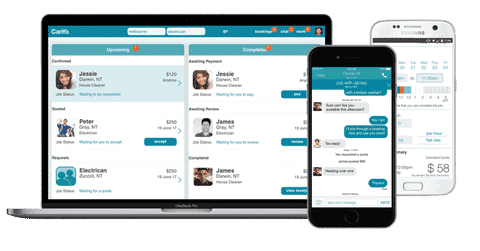To be sure, online sites like Craigslist advertise helpful services–car washers, dog walkers, or landscapers. But even when used for practical purposes, these sites have their flaws. Other than the buyer’s own discretion, traditional online marketplaces have a difficult time screening genuine postings from fake ones. Those that want to hire a helper can be duped by someone with a made up profile. Additionally, centralized marketplaces like Fiverr, Etsy, and Upwork take huge cuts of the profits via transaction and shipping fees (often as much as 20%). After all is said and done, sellers are left with shrunken profits and buyers have paid hidden surcharges. To list ads, potential sellers need to pay a high one-time fee or an ongoing subscription fee. This understandably discourages would-be sellers from conducting business. So what’s the answer? Craigslist 2.0, or a new Etsy? Note quite. CanYa, a blockchain technology platform, is looking to dramatically alter the way online services are exchanged. The Australia based company launched its beta version in December 2016 and has been growing rapidly since then. The Novelty of CanYa’s Blockchain Platform Blockchain technology is new, and it’s definitely expanding. Each week a new startup is launching a platform using decentralized blockchain technology in hopes of providing transparency, accountability, and fair pricing. However, CanYa’s platform uniquely targets the online marketplace by established what it calls a “cryptocurrency-based autonomous marketplace of services.” CanYa is a hybrid blockchain ledger turned service marketplace that allows users to find, book, and pay for services. It is also a place where service providers can provide value to potential customers. To participate, users load their blockchain wallet with cryptocurrencies to spend on the platform. They then convert their coins to CanYaCoins. From here they are free to search for and purchase a variety of services, ranging from healthcare assistance to digital marketing advice.
The decentralization of the platform means that sellers interact directly with buyers. There is no middleman taking a cut. Buyers instantly pay for local or global services using CanYaCoins, and their transactions are added to the blockchain. Other users are relied upon to research and verify new services and providers, ensuring that no false advertising takes place. Additionally, the blockchain ipso facto results in an auditable history of all transactions. Buyers can therefore ensure that pricing is fair and transparent. CanYa’s blockchain platform guarantees that the best service providers get the most exposure. Thus sellers are encouraged to put forth their best work and grow their brand reputation. Sellers are able to differentiate between great providers and mediocre ones–all based upon simple meritocracy. CanYa’s platform, though powered by blockchain technology, runs as a full-featured app available for download through smartphone app stores. With the app, users can list and purchase services in a seamless, transparent way. To date, there are over 8,000 users and 4,000 providers, and the app is growing rapidly. Above all, CanYa gives both sellers and buyers the flexibility to choose how they want their services delivered. Sellers can list services based upon a one time fee–fixing a damaged car bumper–or as an ongoing subscription–semi-annual oil changes. Buyers can choose which service model fits their specific situation. But What About Volatility? A large number of cryptocurrencies have enjoyed enormous price appreciation over the past year. Bitcoin alone is up over 500% from October 2016. But this has come a very high risk premium. Bitcoin’s volatility over the past year (spanning October 2016-September 2017) is a little over 75%. This is quite a bit of price fluctuation to stomach, especially for those who use crypto coins to purchase services. Thankfully, CanYa has an answer. Within CanYa’s blockchain platform there is a built in hedge for cryptocurrency volatility. What this means is that $100 deposited will always equal $100 withdrawn. CanYaCoins are uniquely protected against volatility by its contract, which uses the value of a coin with a proven value as as collateral. Simply put, the value of the coins are frozen and keep their “ideal” properties. The hedge can tolerate downside risk of 0.8, with greater downside risk covered partially. So while crypto coins suffer their usual fluctuations, users can rest assured that their transactions will be completed as negotiated. CanYa’s coin sale will commence on October 15th and will be used to integrate a cryptocurrency payment layer between users. Funds will also be used to expand globally, with the global launch scheduled for March 2018. The CanYa 2.0, which features in-app translation, video calling, and chat-bots, is set to debut July 2018, and an advanced matching feature will roll out in October 2018. Interested parties can go to CanYa’s website to participate in the sale. So far, the only acceptable coin is Ethereum, but CanYaCoins can be stored in many different Ethereum wallets.
